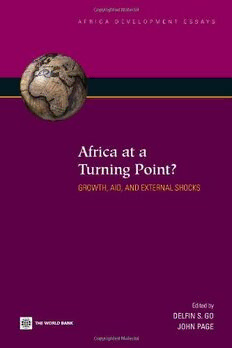
Africa at a Turning Point?: Growth, Aid, and External Shocks (World Bank Development Essays) PDF
602 Pages·2008·3.321 MB·English
Most books are stored in the elastic cloud where traffic is expensive. For this reason, we have a limit on daily download.
Preview Africa at a Turning Point?: Growth, Aid, and External Shocks (World Bank Development Essays)
Description:
Sub-Saharan Africa (Africa) is the world s biggest development challenge. Much of the continent missed two decades of economic progress between 1975 and 1995, with the result that average income per person was virtually unchanged between independence and the turn of the 21st Century. Lagging behind the rest of the developing world in nearly every indicator of human well being, it is also the continent where, on current projections, most of the World Bank millennium development goals (MDGs) are unlikely to be met. Yet, there is renewed hope in recent years. Since the mid-1990s, an acceleration of economic growth in much of Africa has produced rising incomes and faster human development. This growth acceleration has raised questions and expectations about Africa s development. Is there a turnaround in Africa s economy? What will determine whether growth persists? Africa at a Turning Point looks at interrelated aspects of Africa's recent economic revival. It examines Africa's recent growth in the context of its long history of growth accelerations, and collapses and seeks to answer several questions - Is Africa indeed at a turning point? Have African countries learned from past policy and institutional mistakes? And are the economic fundamentals finally pointing towards more sustainable growth? It deals with the continuing importance of donor flows for Africa, addressing such issues as managing and delivering greater aid, and the history and volatility of donor flows. As crude oil prices reach new highs, it also addresses the impact of commodity price shocks on output variability in African countries; how oil exporting countries can manage their new oil wealth; and the possible economic and distributional impacts of higher oil prices on oil importing countries.
See more
The list of books you might like
Most books are stored in the elastic cloud where traffic is expensive. For this reason, we have a limit on daily download.
